Tomorrow’s world教学设计—教案
牛津译林版高中英语必修四Unit3《Tomorrow’sworld》教学设计1

牛津译林版高中英语必修四Unit3《Tomorrow’sworld》教学设计1板块:Reading 1课堂设计指导思想:本课是一节阅读课。
阅读课确实是训练学生阅读明白得能力的要紧途径,因此在阅读课中要用快速阅读和精读相结合、细节阅读和结构分析相结合,以及小结、讨论或辩论等方式,全方位地训练学生的阅读明白得能力。
同时,要使学生迅速地融入课堂活动,也必须创设真实的情境,使学生能在真实地情境中完成各项阅读任务的同时,完成自身内在意义的建构。
Teaching aims:1.Read a business presentation and learn the basic characteristics of a businesspresentation.2.Learn some information about RealCine.Teaching procedures:Step 1 Lead-in(PPT page 4,鼠标点击左下角播放视频,口头提问,注意,请安装最新版的暴风影音和Microsoft media player,视频文件必须放在和PPT课件同一文件夹下,否则路径错误不能播放!)Show several extras from the film Harry Potter to students and ask them the following questions:(1)Do you know what film it is?(2)Do you like it?(3)Do you feel it exciting if you are actually in the film? Why?Answers(Students’ answer)Tell st udents that there is a product that can realize their dreams, the name of which is RealCine, and that they will learn about RealCine in this lesson.【设计说明】由于课文中所提到的RealCine在现实生活中还不存在,因此学生较难对这一概念产生直观感受。
牛津译林版高中英语必修四Unit 3《Tomorrow’s world》(Project 2)教学设计

单元:Unit 3 Tomorrow’s world板块:Project 2课堂设计指导思想:本节课是Project的第二课时,是一节成果展示课。
以学生小组汇报、展示为主。
Teaching aims:1.Prese nt your science fiction story.2.Learn from others science fiction sto ries.Teaching procedures:Step 1 Presentation1.Ask students to present their science fiction stories to their classmates andeach group will send a reporter to do the job. (PPT page 6,显示活动内容和要求)【设计说明】按小组依次呈现自己的作品,每个小组派出一名同学向全班同学汇报自己小组的成果。
Step 2 Discussion(PPT page 5,显示活动内容)Ask students to discuss whose story is the best and why.【设计说明】让学生参与评价过程,能使学生更加积极地参加课堂活动。
Step 6 Summary(PPT page 6,显示活动内容)Make a brief comment on students work at the end of the activity.【设计说明】在活动结束前,教师对学生作品作简要评价,评价要客观、中肯,着眼于激发学生学习的积极性和提高学生英语学习能力。
Step 8 Homework(PPT page 7,显示作业内容)Improve your science fiction stories and collect your works to make a pamphlet. 【设计说明】用家庭作业的形式让学生进一步修改自己的作品。
tomorrow’sworld教案2(高二英语)

英语必修4译林牛津版Unit 3教案(Project)教材:牛津高中英语(模块四)高一下学期文档内容:教学设计—教案单元:Unit 3 Tomorrow’s world板块:Project作者:课堂设计指导思想:本节课是一节以阅读、讨论为主的活动课。
Project是以阅读,语法,及Task 的学习为基础,是语言学习从输入过渡到输出的必然结果。
Project也是一种开放性研究学习活动,学生在完成背景材料阅读任务之后,在教师的指导下,通过小组协作明确选题,然后经过计划、准备、创作、呈现等一系列步骤完成活动任务。
整个活动过程体现了自主学习、探究学习和合作学习。
Teaching aims:1.Read two summaries of the science fiction stories.2.Learn what a science fiction story is like and how to write a science fiction story.3.Work together and make out a summary of a science fiction story.高考链接扫荡狂练:完形填空—夹叙夹议68. I might never have had the chance to feel the deep touch on my soul had my bicycle not broken down. While I was1by the roadside for my bike to be repaired, I caught sight of a tiny bookstore. It was a2place with a narrow door and an interesting name. I am a book lover, likely to be3by every bookstore. I hadn’t4 much of this ordinary-looking bookstore. In fact, I dislike its name UNNAMED. However, a small notice5my attention, “The store is closing in two days, all the books are discounted (打折).”Why was it closing? Maybe, they were selling6books. Anyway, I walked in and looked through the7. I couldn’t believe my eyes8there were so many good books that I had been9to read. I10 a book. I asked the salesgirl while11,“Why are you closing down? You are selling good books.” “12it. We are selling good books.”Seeing that I was puzzled, she13, “The manager is a14of philosophy. He 15his savings into this little book shop in order to direct the people to read what they should read. Therefore, only16who have good taste may possible find their 17here. Actually, we’ve nearly broken and have made no profit (利润). We have to close.”I was18that I even had no courage to give any opinion on the unfairness of what had happened. I just19as if to comfort her and walked out.My heart was hurt. Can20good books be a fault? Can’t the society need good taste?1. A. ridingB. walkingC. sittingD. waiting2. A. popularB. usualC. bigD. central3. A. attractedB. lovedC. consideredD. demanded4. A. assumedB. expectedC. questionedD. consulted5. A. caughtB. stoppedC. cakedD. paid6. A. desperate B. unpopularC. interestingD. valuable7. A. storeB. booksC. shelvesD. door8. A. whyB. becauseC. whenD. while9. A. waitingB. interestingC. eagerD. likely10. A. choseB. boughtC. broughtD. drew11. A. spendingB. payingC. costingD. expensing12. A. CertainlyB. There’sC. ReallyD. That’s13. A. explainedB. adjustedC. thoughtD. smiled14. A. customerB. engineerC. professorD. assistant15. A. droppedB. putC. threwD. got16. A. students B. professorsC. teachersD. those17. A. dislikesB. favoritesC. interestsD. popularities18. A. angryB. shamedC. shockedD. innocent19. A. laughedB. turnedC. stoppedD. smiled20. A. buyingB. shoppingC. sellingD. reading参考答案68.DBABA BCBCA BDACB DBCDC:Teaching procedures:Step1 lead inWatch a movie preview.Ask them a question: do you know the name of the film?It’s the journey to the center of the earth. The film is adapted from the science fiction written by Jules Verne.Give the students some brief introduction about Jules Verne.Questions: Do you know what science fiction is?Can you share with us?Answers(1)Science fiction is a type of writing based on fantasy and imagination. Sciencefiction writers often write about what will happen in ‘tomorrow’s world’.(2)(Students’ answer)Tell students that they will be introduced to two science fiction stories.【设计说明】用影音文件使学生切实地感受到科幻小说的魅力,并进一步产生创作的欲望。
20141高二Unit 3 Tomorrow’s world教学设计
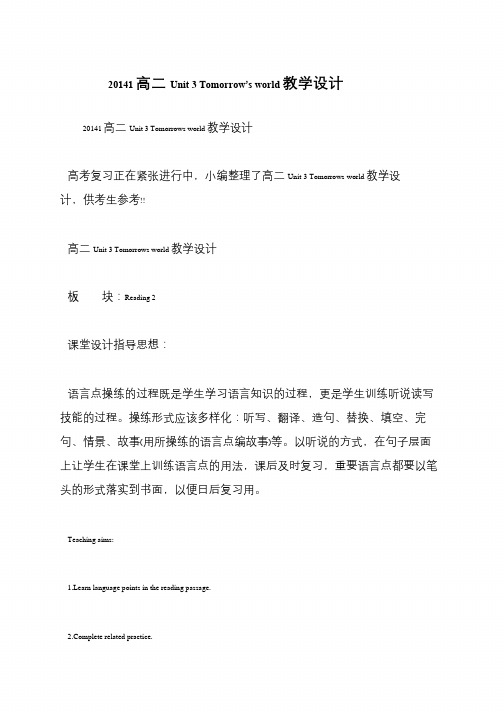
20141 高二Unit 3 Tomorrow’s world 教学设计20141 高二Unit 3 Tomorrows world 教学设计
高考复习正在紧张进行中,小编整理了高二Unit 3 Tomorrows world 教学设计,供考生参考!!
高二Unit 3 Tomorrows world 教学设计
板块:Reading 2
课堂设计指导思想:
语言点操练的过程既是学生学习语言知识的过程,更是学生训练听说读写
技能的过程。
操练形式应该多样化:听写、翻译、造句、替换、填空、完
句、情景、故事(用所操练的语言点编故事)等。
以听说的方式,在句子层面
上让学生在课堂上训练语言点的用法,课后及时复习,重要语言点都要以笔
头的形式落实到书面,以便日后复习用。
Teaching aims:
1.Learn language points in the reading passage.
plete related practice.。
牛津译林版高中英语必修四Unit 3《Tomorrow’s world》(Task)教学设计2
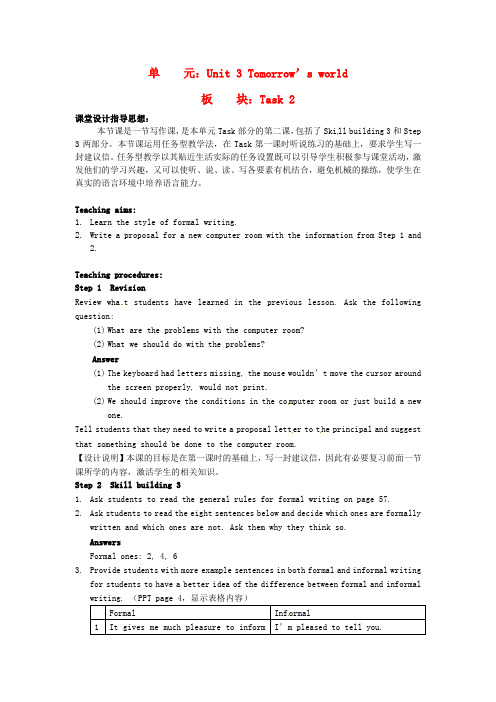
单元:Unit 3 Tomorrow’s world板块:Task 2课堂设计指导思想:本节课是一节写作课,是本单元Task部分的第二课,包括了Ski ll building 3和Step 3两部分。
本节课运用任务型教学法,在Task第一课时听说练习的基础上,要求学生写一封建议信。
任务型教学以其贴近生活实际的任务设置既可以引导学生积极参与课堂活动,激发他们的学习兴趣,又可以使听、说、读、写各要素有机结合,避免机械的操练,使学生在真实的语言环境中培养语言能力。
Teaching aims:1.Learn the style of formal writing.2.Write a proposal for a new computer room with the information from Step 1 and2.Teaching procedures:Step 1 RevisionReview wha t students have learned in the previous lesson. Ask the following question:(1)What are the problems with the computer room?(2)What we should do with the problems?Answer(1)T he keyboard had letters missing, the mouse wouldn’t move the cursor aroundthe screen properly, would not print.(2)We should improve the conditions in the co mputer room or just build a newone.Tell students that they need to write a proposal lett er to t he principal and suggest that something should be done to the computer room.【设计说明】本课的目标是在第一课时的基础上,写一封建议信,因此有必要复习前面一节课所学的内容,激活学生的相关知识。
北师版高一英语tomorrow’sworld教案五篇

北师版高一英语tomorrow’sworld教案五篇第一篇:北师版高一英语tomorrow’s world教案Lesson 1 Tomorrow’s WorldTeaching aims: To use the title of a text to predict the content.To practise using vocabulary of cyberspace.T o practise using will and going to to talk and write about the future.Teaching difficulties: To revise Present Simple and Present Continuous.Teaching Aids: computer and cassette Teaching procedures: Ⅰ.Warming upWhat computers and internet bring us? convenient, high efficient Compared to 20 years ago how do you think technology will change our lives? For example:Go shopping on line.Needn’t carry cash and use credit cards.Instead of going to the bank you can use a computer and a telephone to pay for bills.1.Imagine what happens in the next twenty years? 2.Is it possible that the computer gives us disaster? Look at the title of the article.Which of these topics do you think it will mention? * the Internet * artificial human * time travel * robots * global warming * virtual reality Read the article quickly and check your guess to question 2 above.1.With the development of computers, our life may change in shopping and communicating ways 2.The text infers to us that worry is not necessary and computers and the Internet only do good to us.3.Some experts say in the future we will not go to school in the classroom like us.4.In the future it is possible that people live in another world of outer space.5.The text tell us you can do many things but needn’t go to the place yourself.6.Because of the rapid development of Internet television and the mail will be replaced by computer.Keys: T F T F T T Learning vocabulary Matchthe vocabulary from the text below with the definitions.hacker, chaos, terrorist, the Net(Internet), virtual reality, crash 1.a person who enters other people’s computer programmes in secret 2.The use of computers to make situations feel and look real.3.have an accident by violently hitting something.4.some who does terrible things to harm countries, governments and puter system that allows millions of people around the world to share information 6.A terrible situation in which everything goes wrong Keys: 1.hacker2.virtual reality3.crash4.terrorist5.the Net(Internet)6.chaos Correct error 1.In the last thirty years, the Internet grew rapidly.2.Terrorist may “attack” the world’s computers, cause chaos, make planes and trains crash.3.It is convenient to order tickets from the internet.4.In 1983, there were only 200 computers connect to the Internet.5.It is clear we can use internet to do all kinds of things at home.6.Personally, I’m optimistic about the future of internet.7.As society develops, computers will make our life much convenient.8.The mail service may also disappear as the increasing use of e-mail.Keys: 1.grew 改为 has grown 2.make前加and 3.order 改为book4.connect改为connected5.clear后加that6.of 后加the7.much 改为more8.as 改为with We can feel convenient, we can do all kinds of things from the Internet at home, such as buy books, find out about holiday offers, book tickets and so on.Some traditional things will disappear.We may live in a virtual world.Hacker canget into the computers of banks and government so that change data or steal away important information.Terrorists will attack the world’s computers, cause chaos, make planes and trains crash even and cause nuclear war.Voice your opinion Do you feel pessimistic or optimistic about the future of the Internet? Why? Language points 1.In 1983, there were only 200 computers connected to the Internet.= which were connected to the puter 和connect 是被动关系,因此connected to 是过去分词做定语来修饰computer,相当于一个定语从句。
教学设计Module2 Unit4 Lesson 1 Tomorrow's World
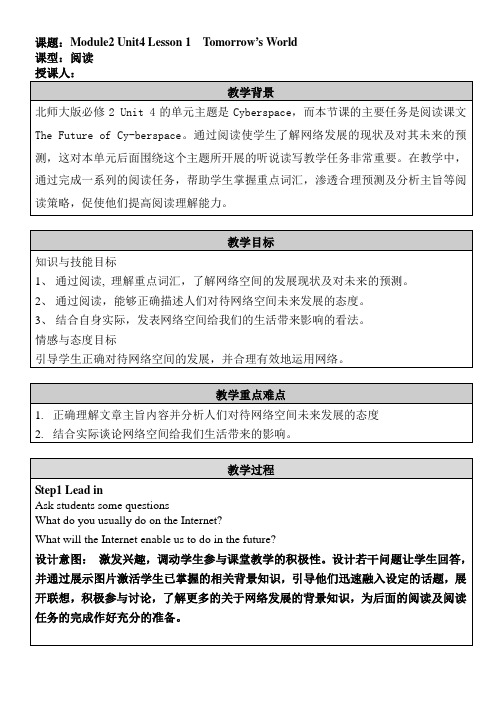
教学过程
Step1 Lead in
Ask students some questions
What do you usually do on the Internet?
What will the Internet enable us to do in the future?
_______ in virtual offices
_______ in virtual supermarkets
_______ in virtual schools
Virtual reality will____________________
设计意图:细读文章,训练学生快速查找信息能力,并分析网络空间的现状及人们对它未来的积极及消极的看法,有效完成阅读任务。
课后反思
从这篇课文所涉及的内容来看,对学生还是有相当的吸引力和了解的欲望。因此,在设计这堂课时,要着重从激发学生的兴趣出发,介绍有关的背景知识,给学生布置具有挑战性的任务,逐步掌握关于网络空间的词汇,通过快速阅读归纳段落主题句,通过搜索细节信息了解网络的现状未来及人们对待它的态度。让学生通过学习,积累词汇,灵活的表达对自己网络的态度。
1the Internet②artificial human③time travel④robots⑤global warming⑥virtual reality
设计意图:通过文章标题、图片及所讨论的内容预测文章可能涉及的话题,引发学生的阅读兴趣。
Step3 While-reading
Task 1:Check your predictions by finding out the topic sentence of each paragraph.
牛津译林版高中英语必修四Unit 3《tomorrow’s world》(reading)word教案

Period2 Language points of Reading一【设计思想】通过真实语境归纳重点语言点用法,并配上形式多样的练习。
二【教学目标】1. To learn some language points in this text to enlarge the vocabulary.2. To use the language points when doing the exercises.三【教学重难点】Learn to analyze some long and complicated sentences.四【教学环节】【课堂导入】Revise the reading strategies learned in the last class.小试牛刀:Personal computers and the Internet give people new choices about how to spend their time. Some may use this freedom to share less time with certain friends or family members, but new technology will also let them stay in closer touch with those they care most about. I know this from personal experience.E-mail makes it easy to work at home, which is where I now spend most weekends and evenings. My working hours aren't necessarily much shorter than they once were but I spend fewer of them at the office. This lets me share more time with my young daughter than I might have if she'd been born before electronic mail became such a practical tool.The Internet also makes it easy to share thoughts with a group of friends. Say you do something fun see a great movie perhaps-and there are four or five friends who might want to hear about it. If you call each one, you may tire of telling the story.With E-mail, you just write one note about your experience, at your convenience, and address it to all the friends you think might be interested. They can read your message when they have time, and read only as much as they want to. They can reply at their convenience, and you can read what they have to say at your convenience.E-mail is also an inexpensive way stay in close touch with people who live far away. More than a few parents use E-mail to keep in touch, even daily touch, with their children off at college.We just have to keep in mind that computers and the Internet offer another way ofstaying in touch. They don't take the place of any of the old ways.1. The purpose of this passage is to ________.A. explain how to use the InternetB. describe the writer's joy of keeping up with the latest technologyC. tell the merits(价值) and usefulness of the InternetD. introduce the reader to basic knowledge about personal computers and the Internet2. The use of E-mail has made it possible for the writer to ________.A. spend less time workingB. have more free time with his childC. work at home on weekendsD. work at a speed comfortable to him3. According to the writer, E-mail has an obvious advantage over the telephone because the former helps one ________.A. reach a group of people at one time convenientlyB. keep one's communication as personal as possibleC. pass on much more information than the laterD. get in touch with one's friends faster than the later4. The best title for this passage is __________.A. Computer:New Technological AdvancesB. Internet: New Tool to Maintain Good FriendshipC. Computer Have Made Life EasierD. Internet:a Convenient Tool for Communication【预习检查】英汉互译/识记短语1.幸福感2.一…就3.允许某人做某事4.鼓励某人做某事5.借助于6.在现实中7.得益于8.受伤9.使…生动10. 长期而言【课堂教与学】重点单词、词组或句子用法探究1.【原句回放】 Imagine the viewer is a character in an interactive films set in the Himalays.(on page 42 line 8)imaginea. If you imagine something, you think about it and your mind forms a picture or idea of it.1). She couldn't imagine living in a place like that.2). Can you imagine how she must have felt when Mary Brent turned up with me in tow?b. If you imagine a situation, you think about it and your mind forms a picture or idea of it.1) It's hard to_______ a greater biological threat.2) Try to _______ you're sitting on a cloud.set. Vt. 为 (故事等)构设背景,使(故事, 剧情)以…… 为背景; 布置(舞台等)The story ___ __ __the early days of World War II.这故事是以第二次世界大战初期为背景.2.【原句回放】Not only is every step of climbing Mount Qomolanguagma felt by the viewer , but also the cold, the tiredness, the food, the smells, the sights and the sounds of the mountain can all be experienced.(on page 42 line8-9 )翻译下列句子,并试着归纳用法。
高一英语tomorrow’s world教案
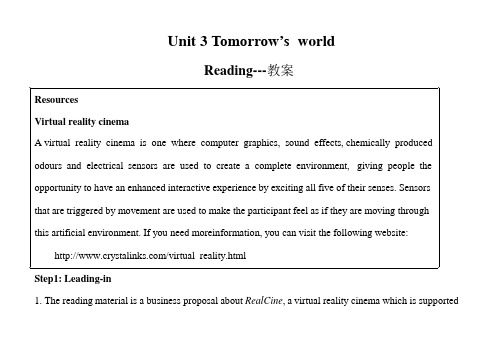
Introduction (Para1) Main body (Paras2-7)
The abstract of theproposal
How RealCine works; Why RealCine is better than ordinary cinema; How it can be used in other ways.
பைடு நூலகம்
C2
1. Paragraphs 3and 4. 2. Paragraphs 2, 5 and 6. 3. Paragraph 7.
2. Answer the following question and fill in thechart according to theproposal. How can RealCine excite the viewers’five senses? Sense Sight Sound Smell Things needed Special VR headsets Special VR headsets Effect in RealCine Viewers can see aworld of 3D animation all around them. Viewers can hear thesounds clearly all around them.
Small openings in the Smells aregiven out. headset
Touch Taste
Special gloves A straw sensor
Viewers can touch people and objects in the film. Special food and drink chemicals are placed into the viewer’s mouth.
【教育学习文章】Lesson1 Tomorrow’s World教案
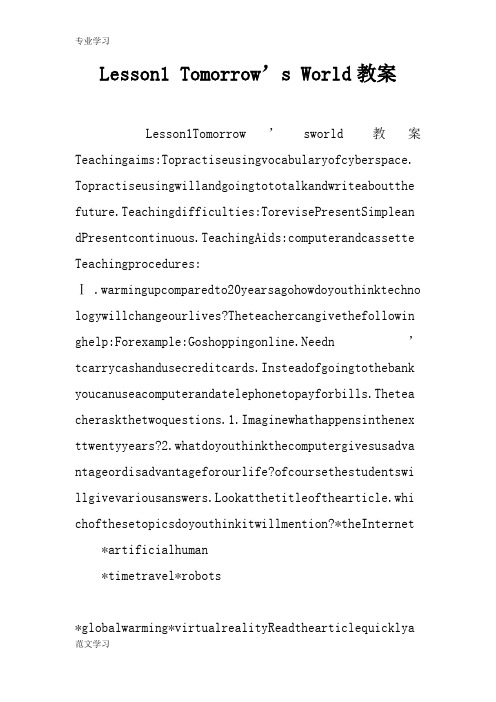
Lesson1 Tomorrow’s World教案Lesson1Tomorrow’sworld教案Teachingaims:Topractiseusingvocabularyofcyberspace. Topractiseusingwillandgoingtototalkandwriteaboutthe future.Teachingdifficulties:TorevisePresentSimplean dPresentcontinuous.TeachingAids:computerandcassette Teachingprocedures:Ⅰ.warmingupcomparedto20yearsagohowdoyouthinktechno logywillchangeourlives?Theteachercangivethefollowin ghelp:Forexample:Goshoppingonline.Needn’tcarrycashandusecreditcards.Insteadofgoingtothebank youcanuseacomputerandatelephonetopayforbills.Thetea cheraskthetwoquestions.1.Imaginewhathappensinthenex ttwentyyears?2.whatdoyouthinkthecomputergivesusadva ntageordisadvantageforourlife?ofcoursethestudentswi llgivevariousanswers.Lookatthetitleofthearticle.whi chofthesetopicsdoyouthinkitwillmention?*theInternet *artificialhuman*timetravel*robots*globalwarming*virtualrealityReadthearticlequicklyandcheckyourguesstoquestion2above.Ⅱunderstandingthetext1.withthedevelopmentofcomputers,somescientistssayitis likelythatcomputercangiveusdisaster.2.Thetextinferstousthatitisnecessaryforustoworrythatt heInternetcandoharmtous.3.Someexpertssayinthefuturewewillnotgotoschoolinthecl assroomlikeus.4.Inthefuturemanypeopleliveinthecyber space.5.Thetexttellsusyoucandomanythingswhichdon’texistinfact.6.InspiteoftherapiddevelopmentofIntern et,butmanythingscan’tdisappearsuchastelevisionandthemailkeys:TFTTTFⅢLearningvocabularyDotheexercise4correcterror1.Inthelastthirtyyears,theInternethasgrewrapid.2.Terr oristmay“attack”theworld’scomputers,causechaos,makeplanesandtrainscrash.3.It isconvenientorderticketsfromtheinternet.4.In1983,th erewereonly200computersconnectingtotheInternet.5.Th isisclearthatwecanuseinternettodoallkindsofthingsat home.6.Personal,I’moptimisticaboutthefutureoftheinternet.7.Associetyd evelops,computerswillmakeourlifemuchconvenient.8.Th emailservicemayalsodisappearastheincreasinguseofe-m ail.keys:1.rapidly改为rapid2.make前加and3.order前加to4.connecting改为connected5.This改为It6.personal改为personally7.much改为more8.as改为withⅣdiscussingwhatpossiblechangesdosomeexpertsbelieveth einternetcanbringtoourlives?whyaresomeexpertspessim isticaboutthefuture?wecanfeelconvenient,wecandoallk indsofthingsfromtheInternetathome,suchasbuybooks,fi ndoutaboutholidayoffers,bookticketsandsoon.Sometrad itionalthingswilldisappear.wemayliveinavirtualworld .Hackercangetintothecomputersofbanksandgovernmentso thatchangedataorstealawayimportantinformation.Terroristswillattac ktheworld’scomputers,causechaos,makeplanesandtrainscrashevena ndcausenuclearwar.VoiceyouropinionDoyoufeelpessimis ticoroptimisticaboutthefutureoftheInternet?why?ⅤLanguagepoints1.In1983,therewereonly200computersconnectedtotheInter net.=puter和connect是被动关系,因此connectedto是过去分词做定语来修饰computer,相当于一个定语从句。
牛津译林版高中英语必修四Unit 3《Tomorrow’s world》(Task)教学设计2
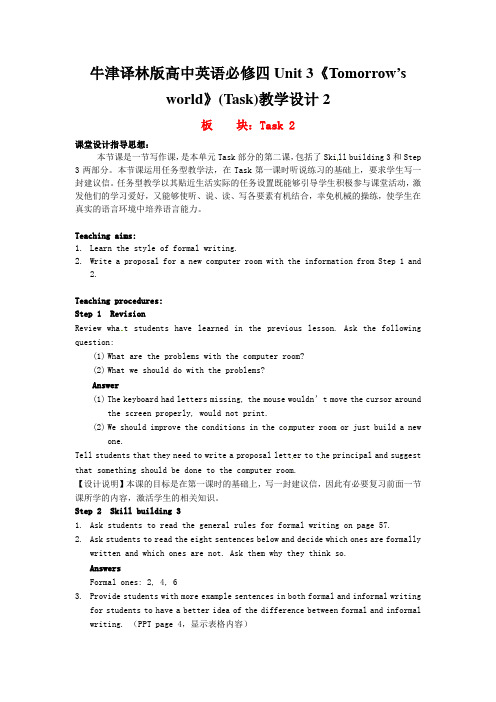
牛津译林版高中英语必修四Unit 3《Tomorrow’sworld》(Task)教学设计2板块:Task 2课堂设计指导思想:本节课是一节写作课,是本单元Task部分的第二课,包括了Ski ll building 3和Step 3两部分。
本节课运用任务型教学法,在Task第一课时听说练习的基础上,要求学生写一封建议信。
任务型教学以其贴近生活实际的任务设置既能够引导学生积极参与课堂活动,激发他们的学习爱好,又能够使听、说、读、写各要素有机结合,幸免机械的操练,使学生在真实的语言环境中培养语言能力。
Teaching aims:1.Learn the style of formal writing.2.Write a proposal for a new computer room with the information from Step 1 and2.Teaching procedures:Step 1 RevisionReview wha t students have learned in the previous lesson. Ask the following question:(1)What are the problems with the computer room?(2)What we should do with the problems?Answer(1)T he keyboard had letters missing, the mouse wouldn’t move the cursor aroundthe screen properly, would not print.(2)We should improve the conditions in the co mputer room or just build a newone.Tell students that they need to write a proposal lett er to t he principal and suggest that something should be done to the computer room.【设计说明】本课的目标是在第一课时的基础上,写一封建议信,因此有必要复习前面一节课所学的内容,激活学生的相关知识。
高二Unit?3?Tomorrow’s?world教学设计
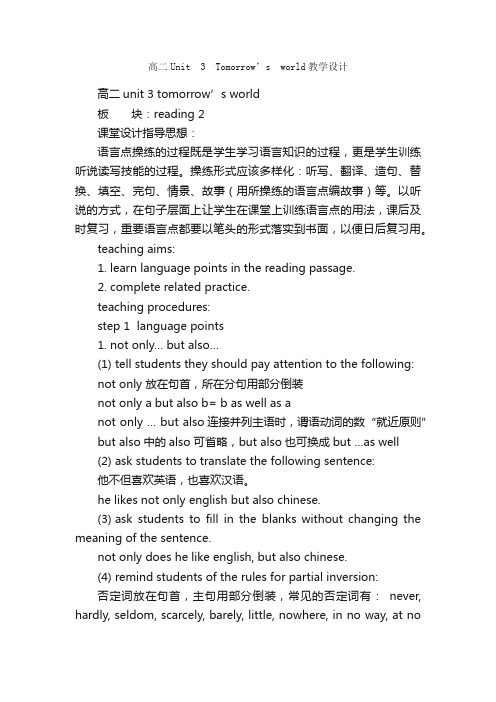
高二Unit 3 Tomorrow’s world教学设计高二unit 3 tomorrow’s world板块:reading 2课堂设计指导思想:语言点操练的过程既是学生学习语言知识的过程,更是学生训练听说读写技能的过程。
操练形式应该多样化:听写、翻译、造句、替换、填空、完句、情景、故事(用所操练的语言点编故事)等。
以听说的方式,在句子层面上让学生在课堂上训练语言点的用法,课后及时复习,重要语言点都要以笔头的形式落实到书面,以便日后复习用。
teaching aims:1. learn language points in the reading passage.2. complete related practice.teaching procedures:step 1 language points1. not only… but also…(1) tell students they should pay attention to the following:not only 放在句首,所在分句用部分倒装not only a but also b= b as well as anot only … but also连接并列主语时,谓语动词的数“就近原则”but also中的also 可省略,but also也可换成but …as well(2) ask students to translate the following sentence:他不但喜欢英语,也喜欢汉语。
he likes not only english but also chinese.(3) ask students to fill in the blanks without changing the meaning of the sentence.not only does he like english, but also chinese.(4) remind students of the rules for partial inversion:否定词放在句首,主句用部分倒装,常见的否定词有:never, hardly, seldom, scarcely, barely, little, nowhere, in no way, at notime, not only, in no case, not until等等。
牛津译林版高中英语必修四Unit 3《tomorrow’s world》(Project)word教案

Unit 3 Tomorrow’s worldPeriod 6 Project一.【设计思想】Learn English through doing a project二.【教学目标】1.Read three summaries of the science fiction stories.2.Learn what a science fiction story is like and how to write a science fictionstory.3.Work together and make out a summary of a science fiction story.三.【教学重难点】1.Improve the reading comprehension.2. Help students work out a summary of a science fiction story.四.【教学环节】【课堂导入】Step 1 Lead-inAnd ask them to read the guidelines on page 58 and answer the following question:(1)Do you know what science fiction is?_______________________________________________________________(2)Do you know any science fiction stories? Can you share with us?_______________________________________________________________Step 2 ReadingAsk students to read the two summaries again and answer the following questions to check their understanding.Journey to the Centre of the Earth(1)Where do the German professor and his nephew travel to?_______________________________________________________________(2)What do they see during their journey?_______________________________________________________________(3)How do they come back to the world above?_______________________________________________________________The Time Machine(1)What has the scientist invented?_______________________________________________________________(2)What does he find when he travels to year AD 802,701?_______________________________________________________________(3)What is the world thirty million years into the future like?_______________________________________________________________Step3:Language points:1.base.(1)vt. base …on/upon: 建立于……之上,以……为根你把希望建立在他的承诺上真是太愚蠢了。
unit4lesson1《tomorrow'sworld》教案(北师大版必修2).doc

Lessonl Tomorrow’ s World 教案Teaching aims:To practise using vocabulary of cyberspace.To practise using will and going to to talk and write about the future.Teaching difficulties: To revise Present Simple and Present Continuous. Teaching Aids: computer and cassetteTeaching procedures:I.Warming upCompared to 20 years ago how do you think technology will change our lives?The teacher can give the following help:For example:Go shopping on line.Needn’t carry cash and use credit cards.Instead of going to the bank you can use a computer and a telephone to pay for bills. The teacher ask the two questions.1.Imagine what happens in the next twenty years?2.What do you think the computer gives us advantage or disadvantage for our life? Of course the students will give various answers.Look at the title of the article.Which of these topics do you think it will mention?* the Internet * artificial human * time travel * robots * global warming * virtual reality Read the article quickly and check your guess to question 2 above.II understanding the text1.With the development of computers, some scientists say it is likely that computer can giveus disaster.2.The text infers to us that it is necessary for us to worry that the Internet can do harm to us.3.Some experts say in the future we will not go to school in the classroom like us.4.In the future many people live in the cyberspace.5.The text tells us you can do many things which don’t exist in fact.6.In spite of the rapid development of Internet, but many things can’t disapp ear suchas television and the mailKeys: T F T T T FIII Learning vocabularyDo the exercise 4Correct error1.In the last thirty years, the Internet has grew rapid.2.Terrorist may “attack” the world’s computers, cause chaos, make planes and trainscrash.3.It is convenient order tickets from the internet.4.In 1983, there were only 200 computers connecting to the Internet.5.This is clear that we can use internet to do all kinds of things at home.6.Personal, I’m optimistic about the future of the internet.7.As society develops, computers will make our life much convenient.8.The mail service may also disappear as the increasing use of e-mail.Keys: 1. rapidly 改为rapid 2. make 前加and 3. order 前加to 4. connecting 改为connected5. This 改为It6. personal 改为personally7. much 改为more8. as改为withIVdiscussingWhat possible changes do some experts believe the internet can bring to our lives?Why are some experts pessimistic about the future?We can feel convenient, we can do all kinds of things from the Internet at home, such as buy books, find out about holiday offers, book tickets and so on.Some traditional things will disappear.We may live in a virtual world.Hacker can get into the computers of banks and government so that change data or steal away important information.Ter rorists will attack the world’s computers, cause chaos, make planes and trains crash even and cause nuclear war.Voice your opinionDo you feel pessimistic or optimistic about the future of the Internet? Why?V Language points1.In 1983, there were only 200 computers connected to the Internet.=which were connected to the Internet.computer和connect是被动关系,因此connected to是过去分词做定语来修饰computer,相当于一个定语从句。
英语:unit3 《Tomorrow's world》教案-word power(译林牛津版必修4)

英语:unit3 《Tomorrow's world》教案-word power(译林牛津版必修4)1. Analysis of the teaching material:This is the 4th period of Unit One. The main purpose of this period is to learn to form abstract nouns from verbs and adjectives by adding suffixes and know some words related to computers and to apply them practically.2. Teaching aims:1) To learn how to form abstract nouns from verbs and adjectives by adding suffixes.2) To know some words related to computers and to apply them practically.Teaching important and difficult points:1) How to make students master the rules of forming abstract nouns from verbs and adjectives.2) Make students expand related vocabulary and apply them practically.Teaching approaches:1) Explanation method to make students master the rules of forming abstract nouns from verbs and adjectives.2) Description method to make students to master some words related to computers.3) Exercise method to consolidate what have learnt in class.Teaching procedures:Step 1Brainstorming1) Enjoy a passage:Jeff Bezos has played an important role in the development of , an online shop selling mainly books and music. He decided to set up when he saw the growing popularity of the Internet.During the first few years, the company did not make a profit and Mr. Bezos thought that his efforts would end in failure. However, Internet connection became faster and a lot of improvements were made to home computers.Words like development, popularity, failure, connection and improvement that refers to an idea, an action, a general quality or something that cannot see or touch directly are called abstract nouns.Most abstract nouns are uncountable. Only a few of them are countable, e.g. a hope, an idea, and a situation.2) Ask them to think about more abstract nouns.illness, dependence, performance, admiration, training…Step 2 Forming abstract nouns from verbs and adjectives1.We can form abstract nouns from some verbs and adjectives by adding suffixes.1). adjectives → abstract no unsExercise2). verbs → abstract nounsExerciseTips:produce→production silent→silencedecide→decision pretty→prettinessplease→pleasure2) Most abstract nouns are uncountable, only a few of them are countable:hope→a hope; idea→a idea; situation→a si tuationyouth(青春)→a youth(青年人);power(电力)→a power(大国);beauty(美丽)→a beauty(美人,美的东西)Do the exercise on Page 462.Read about the history of the world’s most successful online businesses. Use the plural forms to fill in the blanks.Answers:1) development 2) popularity 3) failure 4) connection 5) improvements 6) presentation7) achievement 8) admirationStep3 Words related to computers1 Revise names of some parts of the computer.(screen, monitor, speaker, keyboard, mouse, CD-Rom, printer)2 Teach Ss to learn more words related to computers, especially the most up-to-date hardware: (hard drive, floppy disk, floppy disk drive, U-Disk, ROM, RAM, CPU)3 Teach Ss to understand the functions of different parts of a computer.Step 4 more words related to computersscanner 扫描器sound card声卡Hyperlink 超链接network cardcursor 光标click点击Step 5 Homework1. Revise what we have learnt in this part.2. Try to find more information about computer science.3. Preview Grammar and usage。
- 1、下载文档前请自行甄别文档内容的完整性,平台不提供额外的编辑、内容补充、找答案等附加服务。
- 2、"仅部分预览"的文档,不可在线预览部分如存在完整性等问题,可反馈申请退款(可完整预览的文档不适用该条件!)。
- 3、如文档侵犯您的权益,请联系客服反馈,我们会尽快为您处理(人工客服工作时间:9:00-18:30)。
Tomorrow’s world教学设计—教案牛津高中英语教学设计教材:牛津高中英语(模块四)高一下学期文档内容:教学设计—教案单元:Unit 3 Tomorrow’s world板块:Grammar and usage课堂设计指导思想:本节课是一节语法课。
学习语法是为了运用。
检查学生对语法的掌握情况,主要是看他们运用语法规则的能力,而不是解释语法现象的能力。
所以,在平时的练习及测试中,要以实际运用为主,要让学生在语言交际中运用语法规则,在运用中逐步掌握语法规则。
语法教学要注重精讲多练,重点突出,不必强求系统性、面面俱到。
Teaching aims:the basic verb forms of the passive voice and some special passive patterns.how to use modal verbs in the passive voice.some verbs that are often used in the passive voice.Teaching procedures:Step 1 Lead-in (PPT page 4-6,鼠标点击,显示图片、题目及答案)passive voice with several pictures.(1)The man _________(call) “ Good husband”.(2)The pet dog __________(treat) by veterinary.(3)A frog __________ ( catch) by a big bird just now. Answers(1) is called (2) is being treated (3) was caughtstudents what the basic form of the passive voice is. (PPT page 7)Answerbe + done【设计说明】用生动形象的图片和动词填空,引入主题,复习被动语态的基本形式。
Step 2 The passive voicestudents review the tenses of the passive voice:(1)Simple present tense: am/is/are + done(2)Present continuous tense: am/is /are being + done(3)Present perfect tense: have/has + done(4)Simple future tense: shall/will + done(5)Simple past tense: was/were + done(6)Past continuous tense: was/were being + done(7)Past perfect tense: had been + done(8)Past future tense: would be + donestudents how we can change a sentence into the passivevoice.Remind students that we should pay attention to the following:逐条显示)(1)Find out the object of the sentence and use it as the subject of the sentence with the passive voice.(2)Decide the tense of the sentence and use the related form of its passive.(3)If necessary, use “by” to join the former subject, which should be put into its object form.students when we use the passive voice. Ask them to read Point 3 on page 48 to find the answer. And give them the following sentences as examples:(1)不知道或没必要指出动作的执行者。
Many houses will be built here.(2)强调动作的承受者。
The song “The East is Red” was written by a poor peasant.(3)动作的执行者有较长的修饰语。
The plan was supported by those who wished to have more chances to speak English.(4)出于礼貌,不愿意说出动作的执行者。
You are requested to attend the meeting.students to read Point 3 and 4 on page 48 carefully and complete the following practice.Change the following sentences into the passive voice:(1)All of us like her.(2)We are discussing the question.(3)We have put off the meeting.(4)I will develop my picture next week.Answers(1)She is liked by all of us.(2)The question is being discussed.(3)The meeting has been put off.(4)My picture will be developed next week.Fill in the blanks with the right form of the words given:(1)I ___________(give) a new book by my father on my birthday.(2)English ___________(find) very useful.(3)The work ______________(finish) tomorrow.(4)The flowers ______________(water) by them now.(5)The railway ________________ (build) this time last year.(6)The new way _______ already _________ (build).(7)The new railway ___________ (build) by the end of last year.(8)He told me the sports meeting ____________(hold) the next month.(9)Rice ___________(grow) in the south of the States. Answers(1) was given (2) is found (3) will be finished (4) are being watered (5) was being built (6) has been built (7) had been built (8) would be held (9) is grownstudents to read the four pieces of information about the top four exhibits on page and underline the sentences that can be changed into passive voice. Ask students to complete the report. Remind them of the different tenses of passive voice.Answers(1) are being (2) Electric Wear (3) been developed (4) teenagers (5) was invented(6) are used (7) been completed (8) will be produced (9) will be (10) was announced (11) was shown (12) are cleaned【设计说明】通过实例复习被动语态,把学生自主学习和教师指导相结合,以练习促进理解。
Step 3 Modal verbs and the passive voicestudents how to form the passive voice with modal verbs. Ask them to read the example sentences in Part 2 and show them the pattern:Modal verb + be + done(PPT page 16)students to do the following practice to understand the pattern better.Change the following sentences into the passive voice:(1)The viewer can touch the objects in the film.(2)The viewer may feel a real sense of achievement and happiness.(3)RealCine might not impress some viewers.(4)Teachers could use RealCine in the classroom too.(5)Film-makers should use RealCine for all films.(6)Scientists ought to develop RealCine further.(7)The viewer must wear special gloves.Answers(1)The objects in the film can be touched.(2)A real sense of achievement and happiness may be felt.(3)Some viewers might not be impressed by RealCine.(4)RealCine could be used in the classroom too.(5)RealCine should be used for all films.(6)RealCine ought to be developed further.(7)Special gloves must be worn.students to read the first report in the exercise. Then ask them to complete the second report by referring to the information in the first one.Answers(1) can be reduced (2) must be taken (3) should be made(4) must be worn(5) may become (6) ought to be reduced (7) might be cured 【设计说明】本部分旨在帮助学生理解情态动词用于被动语态时的基本形式,在帮助学生归纳出基本形式之后,用练习帮助学生巩固所学知识。
